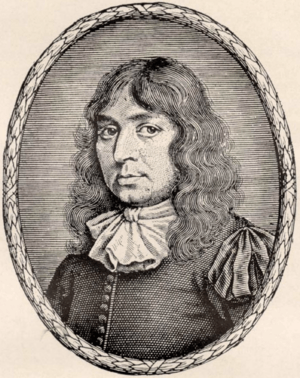John Smyth (Baptist minister) facts for kids
Quick facts for kids
John Smyth
|
|
|---|---|
 |
|
| Born | c. 1554 Sturton-le-Steeple, Nottinghamshire, England
|
| Died | c. 28 August 1612 (aged c. 57–58) |
| Alma mater | Christ's College, Cambridge |
| Occupation | Pastor |
John Smyth (born around 1554, died around August 28, 1612) was an important English minister. He was one of the first leaders of the Baptist church. He also strongly believed in religious freedom, meaning people should be able to choose their own beliefs.
Contents
Early Life
John Smyth was likely the son of a farmer named John Smyth from Sturton-le-Steeple, Nottinghamshire. He went to school in Gainsborough. Later, he studied at Christ's College, Cambridge University. He became a Fellow there in 1594.
Becoming a Minister
Smyth became an Anglican priest in England in 1594. He preached in the city of Lincoln from 1600 to 1602. Soon after, he disagreed with the Church of England. He then moved to Holland with a small group of followers. There, they studied the Bible very carefully. He briefly returned to England before settling in Holland.
Believer's Baptism
In 1609, John Smyth and his group in Holland came to a new belief. They decided that baptism should only be for people who truly believe, not for babies. This is called believer's baptism. They rejected infant baptism. Because of this, they formed one of the very first Baptist churches.
Smyth's Changing Views
When he started, Smyth's ideas were quite similar to his Anglican background. But over time, his views changed a lot. He studied deeply at Cambridge University. This helped him think logically about the Bible. He became very sure that believer's baptism was a key part of what a church should be. He also believed a church should be formed by people who freely agree to join together.
Worship Style
First, Smyth believed that true worship had to come from the heart. He thought that reading from a book during worship was wrong. This idea is still strong among many Baptists today. He felt that prayers, singing, and sermons should be completely unplanned. He even said that reading the Bible during worship was not allowed. He thought a Bible translation was "the worke of a mans witt." He believed worship should be guided by God's Spirit.
Church Leaders
Second, Smyth introduced a new way of leading a church. He believed there should only be two types of leaders: a pastor and a deacon. This was different from the Anglican church, which had bishops, priests, and deacons. It was also different from other Protestant churches that had more types of elders.
His Own Baptism
Third, Smyth's new ideas about baptism created a challenge. He and his followers had been baptized as babies. Now they believed they needed to be baptized again. But there was no other minister who shared their new beliefs to baptize them. So, Smyth baptized himself first. Then, he baptized his followers. Because he baptized himself, some people called him "the Se-baptist."
There was a story that Smyth was baptized in a river in 1606. This story said he was baptized at midnight in the River Don. But this account was later found to be a fake story. It was made up to connect a church in Crowle to an earlier founding date.
End of Life
Before he died, Smyth felt sorry that he had baptized himself. He even wrote a letter saying he was sorry. He started to agree with some ideas of the Mennonite church. This was especially true for their beliefs about Jesus. Because of this, another leader named Thomas Helwys removed Smyth from their church.
Smyth and some of his church members joined a Mennonite church. But Helwys and the rest of the church went back to England. There, they started the first lasting Baptist church in 1611. This was the same year the King James Version of the Bible was first published.
The churches that came from Helwys's group were called General Baptists. Historians say they got this name because they believed Jesus died for everyone. This was a different idea from some other groups who believed Jesus died only for a chosen few. Smyth also eventually believed that everyone had the right to their own religious views. One of his important writings was The Differences of the Churches of the Separation.
Influence
Some historians believe John Smyth may have created certain religious terms. These include words like Pedobaptist (someone who baptizes babies) and Presbyterian (a type of church government).
It is also thought that Smyth helped shape the idea that the Bible is completely true. This idea is very important to many Baptists today.
Images for kids
See also
 In Spanish: John Smyth para niños
In Spanish: John Smyth para niños
 | William M. Jackson |
 | Juan E. Gilbert |
 | Neil deGrasse Tyson |



